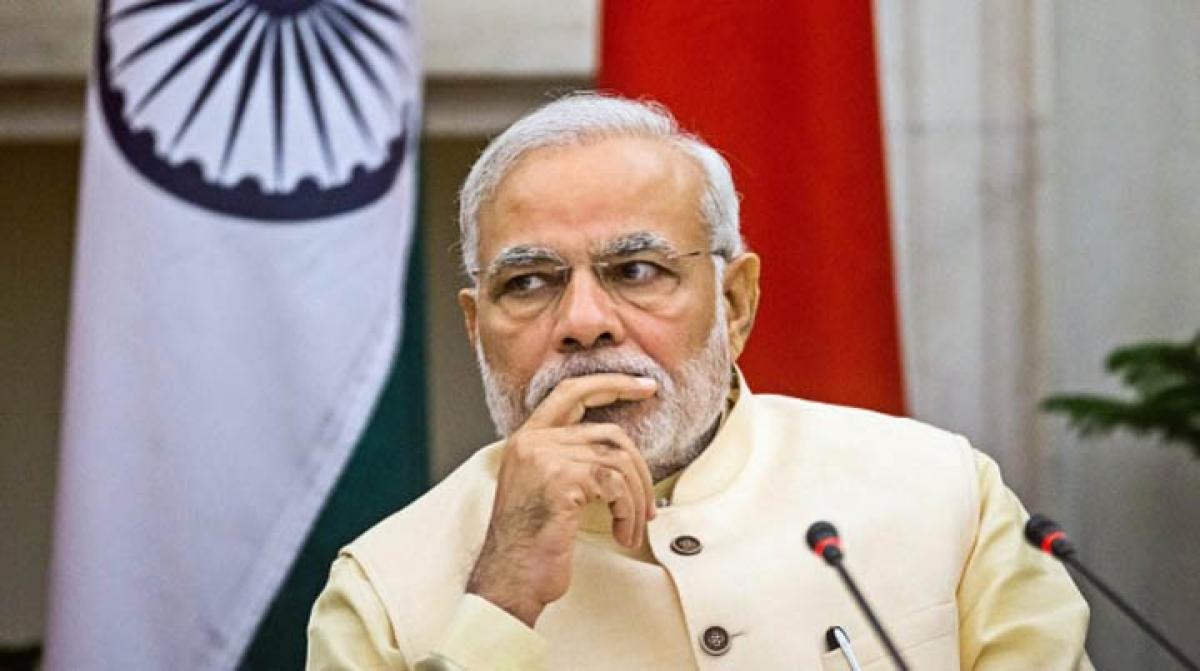Live
- Cold wave conditions in five Bengal districts, says MeT office
- Pawan Kalyan to fly to Hyderabad, amid Allu Arjun's arrest
- High Court Declines Allu Arjun’s Plea to Quash FIR, Suggests Filing Bail Petition
- Husband of Stampede Victim Supports Allu Arjun’s Innocence
- Mehidy Hasan denounces bowlers after 3-0 ODI series loss vs WI
- Chiranjeevi Visits Allu Arjun’s Residence Amid Legal Turmoil
- Over 1.1 million Syrians homeless since recent escalation of hostilities: UN
- NBA’s 'commitment to constant innovation' in Covid chaos led to the birth of in-season tournament
- SC issues notice on PIL for conducting public awareness campaign on snake bites
- Varun Dhawan Becomes First from Film Fraternity to Support Allu Arjun
Just In
India's democracy allows for fetishised nationalism, knee-jerk rejectionism

30 Nov 2015 6:24 PM IST

x
Highlights
India, or at least parts of it, is going through a weird phase of fetishised nationalism and knee-jerk rejectionism. The divide is between those who profess unquestioning nationalism and are staunch supporters of Prime Minister Narendra Modi and those who castigate everything and are virulently antagonistic to the prime minister.
India, or at least parts of it, is going through a weird phase of fetishised nationalism and knee-jerk rejectionism. The divide is between those who profess unquestioning nationalism and are staunch supporters of Prime Minister Narendra Modi and those who castigate everything and are virulently antagonistic to the prime minister.
.jpg)
Social media seems neatly divided between those who insist Modi can do no wrong and those who assert that he can do no right. Prime Minister Modi is not merely a person but is more of a metaphor that represents a certain type of resurgent Indian thinking.
A subset to this rigid posturing on both sides is the shrill debate over whether India has become more intolerant with the rise of Modi's Bharatiya Janata Party (BJP) and his Hinduist affiliates. Both sides come across as sanctimonious and self-righteous.
The simple fact is that if India is intolerant now, it was always that way. And if it is tolerant now, it was always that way. India has not fundamentally changed, but the articulators of its core values have. That has much to do with the sheer size of its population and inherent religious, cultural, demographic and linguistic diversity.
It is absurd to think that a nation of 1.25 billion people, which is home to six world religions, can be treated with monolithic certitudes. Purely in terms of its demographic heft and diversity one can create about a dozen separate countries out of India. With that being the case, how does anyone say anything with such finality? There is no comparable multi-religious, multilingual and multi-cultural democracy of India's size and complexities. That uniqueness demands a far deeper engagement than what the shallow hordes that run amuck on social media practice.
However, even those shallow, often uninformed and misinformed people on social media, collectively called trolls, serve a greater democratic purpose than the kind of misanthropic epidemic that is debilitating parts of the Middle East and Africa. No matter how unpleasant their counter to the liberal, reasonable positions may be, at most what they indulge in is verbal crassness.
Sections of the mainstream media, which has been long used to being the arbiter of the nation's moral destiny, suddenly find themselves challenged and ambushed in real time, all the time. That any Singh, Patel, Reddy, Rao, Kulkarni or Das can bypass the gated opinion-making establishments of Delhi that the mainstream media used to be and directly express their angst has also greatly unsettled professional journalists.
Conversely though, even those who hold journalists in contempt and describe them as "presstitutes" fail to understand the irony that everything they know, opine and fulminate over comes from the very media they despise. They mistake access to social media platforms on their mobile phones for official access to the real powers that be and their own opinions as professionally vetted information.
It is in this current climate that dissenting the nearly doctrinaire position on either side of the divide now has become a lazy synonym for bigotry and treason. One is either bigoted or treasonous. There are no shades left at all in the national colour palette. There is no lesser transgression left; it is best to be on the sidelines and watch the current spectacle of idiocy run its course.
What we have now are echo chambers where like-minded people get together and keep repeating each other's ideas and positions in the smug assurance of the righteousness of their respective positions. Nowhere is this more evident than on Facebook and Twitter. There is such boring predictability to people's outrage on these platforms, no matter what their ideological or cultural persuasion. The outrage comes in waves and then subsides until another tide rises. It dumps some dregs on the shore, only to be swept back.
As a print journalist with over three decades in the profession I applaud the extraordinary opportunities and platforms that those outside the profession now have to say their piece. Notwithstanding their often unvarnished construct and fractured cohesion, such opinions eventually strengthen India's democracy because they allow millions to let their steam out mostly without beheading anyone. It may be useful though if those who exult with fetishised nationalism or reject with knee-jerk contempt bother to first acquire enough first-hand knowledge to do either.
By Mayank Chhaya
(The author is a senior journalist based in Chicago. The views expressed are personal. He can be contacted at [email protected])

Next Story
More Stories
ADVERTISEMENT
© 2024 Hyderabad Media House Limited/The Hans India. All rights reserved. Powered by hocalwire.com






